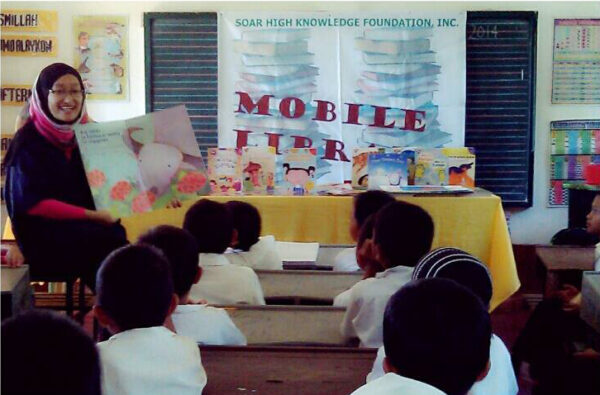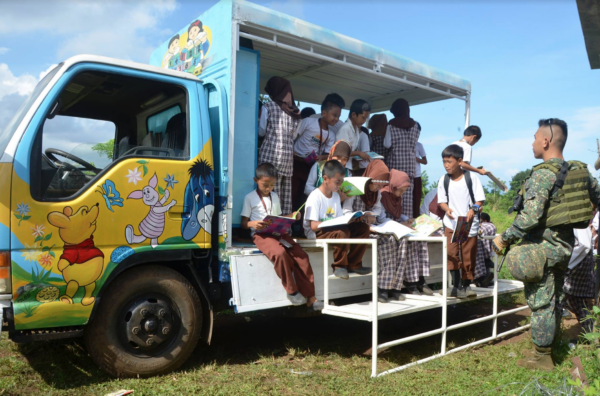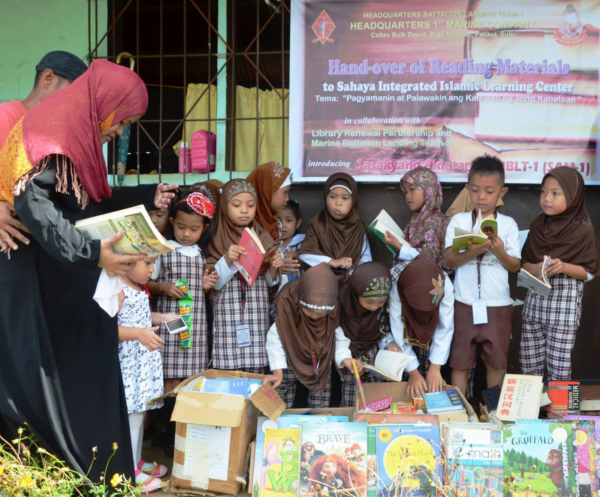
The Philippines’ Library Renewal Partnership
“The LRP has not only encouraged a love within indigenous and marginalised communities for their heritage but has also equipped them with knowledge and resources to improve their literacy rates and face the future.”
According to a 2021 World Bank study on reading, 9 out of 10 Filipinos aged 10 cannot read, translating to a learning poverty of 90 percent¹, among the lowest in the world. The Library Renewal Partnership (LRP) aims to stem the tide by building 200 libraries in poor communities. Since 2010, the LRP has exceeded this initial goal by helping to build over 1,100 libraries, with a significant number serving people in areas populated by minorities and marginalised citizens, including Muslims and indigenous people, giving them access to books and other educational resources. The libraries also provide these communities with a third space to congregate and discuss important issues.
The LRP uses the following strategies to achieve this:
- Interdisciplinary and multi-sectoral collaboration
The LRP works collaboratively with the local government to build libraries in targeted communities. The LRP’s coalition of partners and donors transfer knowledge to empower the indigenous people in the poor communities. - Providing career opportunities in the community
The college graduates of the indigenous communities are hired to work as volunteers and de facto librarians, enabling the community to provide employment to their own people and ensuring the integrity of the library holdings. In the long run, these educational benefits support greater access to livelihood and an upward standard of living. - Curating community-driven content
Books, magazines and audio-visual materials are curated in consultation with local stakeholders to ensure the preservation of traditional culture and heritage of the indigenous communities. The librarians focus on the needs of the indigenous people by conducting visitor surveys and interviews.
The Philippines has had the Republic Act 7743 in place since 1994 that mandates the creation of a public library in every municipality to increase the literacy rate but less than one-third of the country’s 1,634 towns and cities have libraries.
Interdisciplinary and multi-sectoral collaboration
Founded in 2010 by Quintin Jose Pastrana, the Library Renewal Partnership (LRP) is a coalition of local and international partners that aims to empower over two million citizens by building at least 200 libraries to help forge an interconnected archipelago of readers and leaders. To date, the LRP has surpassed that target five-fold, with over 1,100 libraries built as of September 2022, with beneficiaries now in the millions.
The focus is on building and establishing community libraries as strategic community centres and knowledge hubs through the collaborative efforts of the local government and the LRP’s partners and donors. For each library, the local government is responsible for providing a minimum average area of 70 square metres, shelves, chairs, internet connection and library overheads such as electricity, library staff salaries, maintenance and repairs. The LRP’s coalition of partners and private donors donate Filipino and international books and magazines, and also provide literacy programs, up to five computers, a photocopying machine, multimedia (VCR, DVD, TV), decor and artwork.
The partners and private donors range from bookstores, publishers, high schools and universities, literacy-related NGOs, Filipinos living overseas, local government units, the National Library of the Philippines and the National Commission on Indigenous Peoples who not only provide resources to the libraries but also share their expertise and best practices from each sector and transfer knowledge to empower the indigenous people in the poor communities.
The LRP has built libraries in the poorest areas of the country, with a focus on the ancestral domains where the indigenous people live, including Batanes, Benguet, Kalinga, Lanao del Sur, Mountain Province, Nueva Vizcaya, Occidental Mindoro, Oriental Mindoro, Palawan, Pampanga and the Bangsamoro Autonomous Region of Muslim Mindanao (BARMM). They have reached the indigenous communities of Aeta, Badjao, Ivatan, Kalinga, Kankanaey, Mangyan, Tagbanwa, Samal, T’boli, Manobo, Meranaw, Tingguian and Tausug as well as other Muslim communities in Mindanao. The hundreds of community and school libraries in these areas serve the needs of more than 200,000 indigenous people.
The LRP has also set up mobile libraries in the war-torn city of Marawi in Lanao del Norte and the far-flung towns of Sulu since permanent libraries cannot be set up due to a lack of buildings and the unstable peace-and-order conditions still prevailing in some of the communities.

A mobile library with a local teacher goes around the war-torn city of Marawi in Lanao del Norte, Mindanao, to bring books to schoolchildren. Photo credit: Library Renewal Partnership.

‘Sasakyang Aklatan’ (‘Library on Wheels’) goes around Patikul in Sulu, the southernmost island in Mindanao, through the joint efforts of the LRP, the Alegado Foundation, the local government and the Philippines’ military. Photo credit: Library Renewal Partnership.
Providing career opportunities in the community
The elders of the tribe are consulted and college graduates from the indigenous communities are hired to work as volunteers and de facto librarians by both the libraries and local businesses—an incredibly positive action which provides employment to the community’s own people and ensures the integrity of the library collection. The librarians also choose the artwork for the library, which they hang on the walls to promote awareness about the indigenous heritage and culture of the people. Providing professional career opportunities in the libraries also fosters independence in the community.
Aside from facilitating employment in the libraries to the indigenous communities, the LRP is also helping the libraries to develop their indigenous collections, oversee staff training, set up literacy programs and offer subsidiary services, especially for the young people who had used the internet services of the libraries for their online classes during the COVID-19 pandemic.
Moreover, the indigenous librarians hold regular, virtual meetings throughout the year in which they discuss and work through any issues, share ideas, participate in training and exchange information. They also have a tribal library census and a needs assessment, with the consensus forwarded to the barangay (village) chiefs for action.
Curating community-driven content
The librarians curate the Filipino and international books, magazines in the library collection as well as the films and documentaries in the holdings to ensure that the materials reflect and respect their cultural heritage and traditions. Other sources of popular culture such as music and online materials are curated to drive interest in visitors of all ages. This process to attain such a well-rounded collection helps to empower the communities by promoting a love of learning and improving the literacy rates among its people.
To navigate through the broad digital landscape, the LRP in partnership with the Philippine Librarians Association (PLAI), has drafted protocols to guide the sensitive use of library technology in relation to information resources, particularly in relation to heritage material. The librarians also compile articles, news items and reviews of newly published books centred on indigenous topics, making their libraries true repositories of indigenous knowledge.
The librarians seek feedback from the indigenous communities in relation to their services through interviews and visitor surveys. They ask the communities what their information needs are and how they view the libraries. They also ask how the libraries could better meet their needs. The results of the surveys, with accompanying recommendations, included those which suggested the prevalence of stereotypes regarding the indigenous communities (“ignorant and backward”), over-represented in negative social statistics and that libraries could empower the indigenous communities. In response to these survey results, the LRP made a call for more books and periodicals that highlighted the achievements of indigenous people. Half of the libraries have received materials that address this issue. The donations were curated by the indigenous librarians. The librarians now also hold reading sessions with the children where picture books in Filipino or the native languages are shown and read to pupils from kindergarten to grade 2 levels, following the mother tongue approach to learning from the Department of Education.
The librarians also address intellectual property issues. Similar studies in other parts of the world have deplored the lack of culturally appropriate research aids for indigenous community libraries, including indexes, inventories and adequate subject headings.
Moreover, part of the indigenous librarians’ work is to inform the people about the Indigenous People’s Law in the Philippines as well as the mining law. The Indigenous People’s Law grants the tribes ownership of their ancestral domains and allows them to take responsibility for their cultural and economic development. They are empowered to be the primary decision-makers. The Mining Law states that the mining that is to be done on ancestral domains needs the free, prior and informed consent of the indigenous leaders, with the accruing profits to go back to the tribes.
The indigenous community libraries are beehives of activities. Among the projects being carried out are bibliographies to pull together literature and other materials related to the heritage of the individual tribes. Other initiatives in progress include working cooperatively on library development, the translation of texts in their native tongues and the protection and perpetuation of their culture, especially targeting the youth in the community in this process as they are increasingly drawn to live in the urban centres.

Children from the Muslim and indigenous population in Cotabato City receive free copies of picture books from the Library Renewal Partnership, with books curated by a teacher from the local population. Photo credit: Library Renewal Partnership.
The indigenous librarians of LRP subscribe to the 10 principles outlined by the United Nations in their 1997 report on the Protection of the Heritage of Indigenous People. One principle is that the indigenous people should be recognised as the primary guardians and interpreters of their cultures, arts and sciences, whether created in the past or to be developed by them in the future.
These principles are actualised in the libraries and third spaces that the Library Renewal Partnership has built in the Philippines’ Muslim and indigenous communities. The LRP has not only encouraged a love within indigenous and marginalised communities for their heritage but has also equipped them with knowledge and resources to improve their literacy rates and face the future.
The LRP has helped build over 1,100 libraries as of September 2022, far exceeding its target of 200 libraries. It continues to build more libraries, especially now that the strict COVID-19 lockdowns have ceased and more Filipinos living overseas can send book donations with the return of sea and air freight services. The LRP continues to work with local government officials to fund projects involving literacy and cultural development. With the easing of domestic travel restrictions, more people are also signing up as volunteers to deliver books to the far-flung islands of the Philippines’ archipelagos, crossing seas and mountains to help their fellow Filipinos to improve their and the country’s literacy rates and livelihood opportunities.
¹ The World Bank, UNESCO. Philippines: Learning Poverty Brief, July 2021. http://documents.worldbank.org/curated/en/972851624613012971/Philippines-Learning-Poverty-Brief-2021
Danton Remoto
| Danton Remoto was a Fulbright scholar at Rutgers University and a British Council scholar at the University of Stirling. He was a resident fellow at the Bread Loaf Writers’ Conference and the MacDowell Arts Colony, as well as a literature fellow at the Cambridge University Summer Seminar. His latest book is Riverrun, A Novel, from Penguin Random House. He has also worked as Head of School-English and Professor of Creative Writing at the University of Nottingham Malaysia and Head of Communications at the United Nations Development Program, as well as Dean and President of The Manila Times College. He also had a daily radio-TV show that ran for six years and he has been writing columns for the Philippine press since 1990. He is writing his second novel as well as his memoirs. |
What is the Imagine Around the World Project?
A partnership with the British Council Australia, the Imagine Around The World Project aims to document case studies from numerous countries outside of US, UK, Canada, Australia and New Zealand to share best practice and leadership in cultural diversity, cultural equity and inclusion in the arts, screen and creative sectors. This project is managed by Diversity Arts Australia and supported by Creative Equity Toolkit partner, British Council Australia. To find out more click below – or read the other case studies as they go live here.

